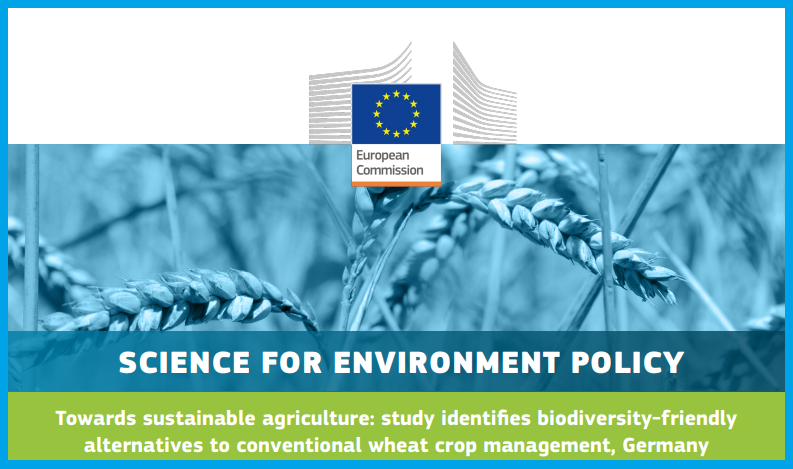holistic management of emerging forest pests and diseases
Science for Environment Policy: In pursuit of sustainable agriculture
The European Commission’s news alert service Science fFor Environment Policy has issued its latest newsletter under the title "Towards sustainable agriculture: study identifies biodiversity-friendly alternatives to conventional wheat crop management, Germany". The text is based on an article by Redlich, S., et al., called "Sustainable landscape, soil and crop management practices enhance biodiversity and yield in conventional cereal systems.", published in the Journal of Applied Ecology.

Image from Science for Environmental Policy
As intensive agriculture is associated with large-scale impacts on biodiversity, ecosystem services, food security and human health, it is important to shift to more sustainable, yet highly productive, farming practices.
A study explores which practices are suitable to encourage farmers to adopt a more environmentally sustainable and ecology-focused approach to agriculture via EU programmes and policies such as the Common Agricultural policy, and how these practices affect agricultural yield when compared to conventional intensive methods. The study focuses on winter wheat (Triticum aestivum) fields in Germany and considers non-adaptable drivers (e.g. soil characteristics) and common intensive farming practices (e.g. agrochemical use) to identify local and landscape-scale management options that can reduce the negative environmental impacts of agriculture, and feasibly be applied to real agroecosystems.
The results showed plant biomass and grain yield to be strongly correlated and to increase with fertiliser application (by 26% and 30% respectively), but found no direct links between yield and insecticide application, pH or soil organic carbon content. There were no direct relationships between extensive crop management and yield quantity, but yield quality was greater in fields with high crop-rotation diversity or no-till methods of soil preparation.
Furthermore, agrochemical inputs had the strongest influence on yield quantity but on the other hand, the results indicate that reduced pesticide application may increase yield quality without significantly increasing pest pressure, and that biodiversity-enhancing management options such as no-till soil preparation and high crop-rotation diversity can enhance natural predation. As the effects of soil, management and landscape factors may be exaggerated by future climate change, the researchers highlight, such biodiversity-enhancing measures may also help strengthen the resilience of cropping systems to future global change (such as new pests, diseases or extreme weather events).
Source: Redlich, S., Martin, E. A., and SteffanDewenter, I. (2020) Sustainable landscape, soil and crop management practices enhance biodiversity and yield in conventional cereal systems. Journal of Applied Ecology, 58 (3): 507–517.
You can read how the research was conducted and also the full newsletter here.